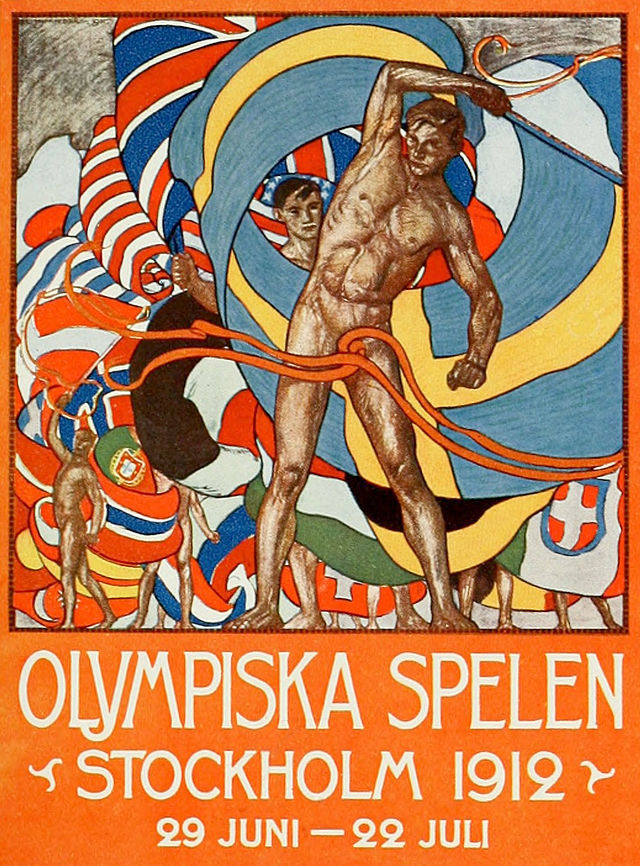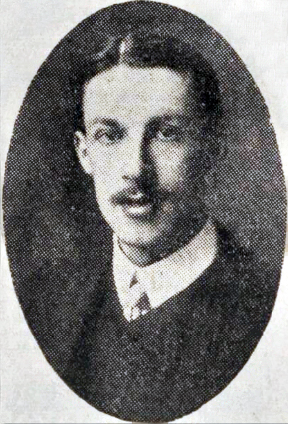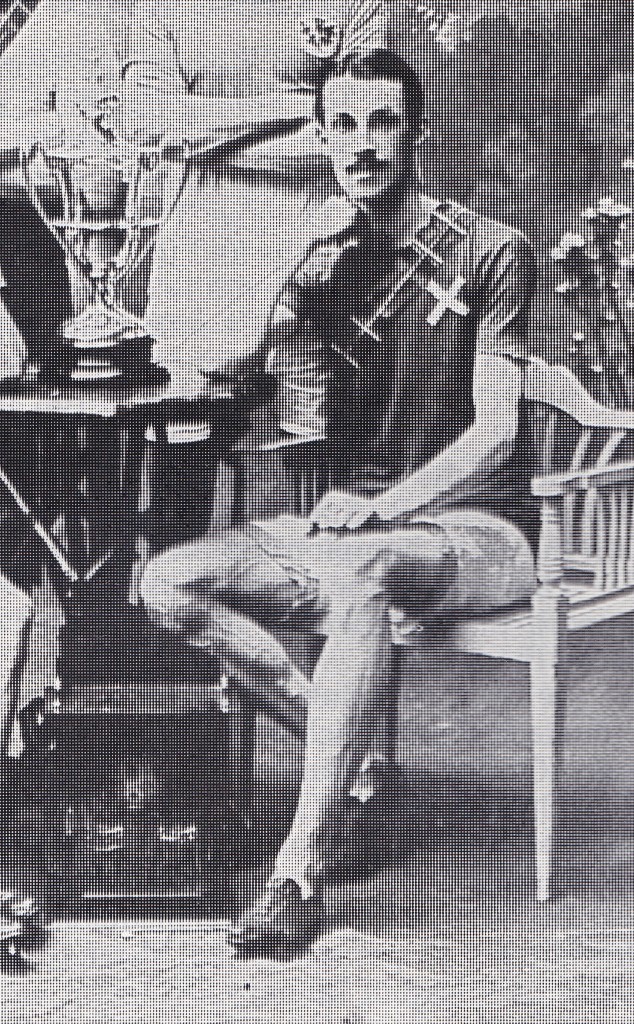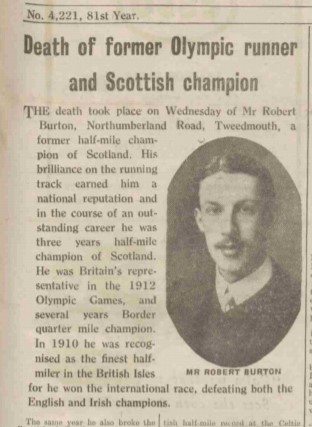Robert Burton
Robert Burton’s name is often seen as RH Burton, but he was born Robert Burton in Hawick on 11th April 1885. When he was a runner he lived in Tweedmouth and worked in the timber trade as a timber merchant’s clerk, later moving back to Hawick and taking over as head of the Tweed Saw Mills. He was a member of both Teviotdale Harriers and Berwick Harriers. “First Hundred” by John L Coltman writes that the Hawick Press described him in 1909 as “The best half-miler Scotland has yet produced, his strong finishes being a special feature of his running.” …. “The climax of his illustrious career on the track was his selection for the 1912 Olympic Games in Stockholm. However writing home he said, ‘I turned out in my heat in the 800m but could not do what was asked of me.’ ” It also says “Six times between 1908 and 1912 he ran for Scotland in the half-mile, five of which were against Ireland, the other an Irish-American team; he won the Scottish half-mile championship in 1908, 1909 and 1910; and added to this as the Border quarter-mile championship for four successive years from 1910.”
Alex Wilson comments that he was certainly a top class runner and Scotland was fortunate at this point to have two excellent exponents of the event, James Soutter from Aberdeen being the other. Their paths would cross often over the years and each would have his share of victories. With the major statistics readily available via the standard history books, he should be better known than he is.
***
Burton was born on 11th April in 1885 in Aberdeen One of the first British athletes to experiment with using oxygen during training.
His first Scottish title was won in 1908. In the ‘Glasgow Herald’ of 22nd June, 1908, the comment was made in the preview of the SAAA Championships on 27th June at Saughton that ‘there is a dearth of talent in the half-mile and mile events this season, more so than for some years, and it is therefore expected that John McGough will again have the honours to himself.‘ When it came to the event itself however, things were a bit different. “Of the flat events, it is hard to sat which aroused the greatest interest ….. each contest was more exciting than the other. John McGough through a weakened tendon Achilles had to stand down. The half-mile was won by Burton in 2 min 02 sec. Turnbull might have troubled the leader more had he made his effort earlier.” The actual race report read: “The holder who is suffering a strained tendon, acting on doctor’s orders, did not run. GW Young, Bellahouston, was leading at the bell from Burton who went into second place 300 yards from home. Responding to Young’s challenge, Burton was a winner all the way and won by six yards from Turnbull. JM Bruce, Edinburgh University was third, close up, and just finished outside record time. The winner ran practically untrained and is a grand natural runner. He won the Berwick quarter-mile cup the last two years and has only to win it again this year to make it his own property.”
As a result he was chosen for the international against Ireland on the evening of Saturday,11th July, along with Turnbull with Young as reserve. He ran well enough to be second in a close finish: “A Turnbull (Clydesdale) made the running from Morphy until halfway down the back straight, when the Irish champion went to the front with the Scottish champion in close pursuit. It was a neck0or-nothing race up the home straight with Morphy getting the verdict by inches. 1. GM Morphy, Dublin University; 2. R Burton, Berwick and District Harriers. 2:00.8.”
It is surprising that, in Olympic year with many Olympians from several nations competing at Rangers Sports on both Saturday afternoon and Monday evening meetings, there was no sign of Burton’s name among the prize winners or indeed any indication that he had competed there. It may be that living in the south of the country, and being rather inexperienced in the sport he found it difficult to attend such meetings.
His second SAAA championship victory was on 26th June, 1909, at Ibrox in Glasgow where he won the 880 yards in 2:00.4. He won the title by a yard from Adam Turnbull of Clydesdale Harriers and was selected for the international against Ireland on 17th July. He had been badly spiked in the process of winning the championship and could only manage three days training before the match at Balls Bridge in Dublin on 17th July. It was not a match in which the Scots covered themselves with glory, winning only 3 events out of the 11 contested, but Burton ‘showing rare judgment’ went one better than the previous year and beat Morphy of Ireland by two yards in 2:00.8.
1910 saw his third successive victory in the national 880 yards championship. This was held on 25th June at Powderhall and Burton raced in both 440 yards and 880 yards. The 880 was his fastest yet, the winning time being 1:59.6 – but it was the first time he and James Soutter had come up against each other in the championship. Burton was also second to GRL Anderson in the quarter mile with George Dallas third, the winning time being 53 seconds. The result of the half mile was that Burton and Soutter faced the Irish in the international held at Ibrox on 9th July. Burton went faster still when he won from Soutter in second in 1:58.8. He was again second to Anderson for a Scottish 1-2 in the 440 yards, won in 50.8. Anderson was a student at Oxford who was both AAAand SAAA hurdling champion and although Burton was a 440/880 type of half-miler rather than a 880/Mile type he would always have a sharper finish than Burton. The report on the half-mile read: “The first lap was practically a parade, though a very fast one, the time being 58 2-5th sec. Hill led at half distance, Harrison following close on his heels. It was in the second and concluding quarter that that the competitors collected their wits as well as their pace. With 300 yards to go, Burton went to the front, of which he was robbed by Hill, whose lead in turn was only momentary as Soutter, with a fine turn of speed, shook off the Anglo-Irish runner. Burton likewise disposed of Hill and a great struggle between the two Scottish representatives ended with the champion winning by a foot, there being three yards between Soutter and Hill.” In the quarter Burton was defeated by a single yard. The big thing however was that the 880 yards time equalled the Scottish record.
Having equalled the record in July, he did even better on 13th August 1910 when he broke the record with 1:58.4 at Celtic FC Sports. Sometimes everything goes right and that Saturday at Celtic Park was just such a time. ” The weather was charming, the huge crowd were in excellent spirits, the running was always interesting and often exciting.” The report on the race read: “In the invitation half mile Burton, the SAAA champion, lowered native record from 1:58.8 to 1:58.4. The race however was won by JC English (Manchester AC) in 1:57.2. He had a concession of 20 yards and won by three from JH Rodger (West of Scotland Harriers), 12 yards, who from a time point of view acquitted himself with just a little less distinction than Burton.”
Photographs from Alex Wilson
The SAAA Championships in 1911 took place on 24th June at Hampden, and the preview of the race read: The half-mile is expected to be the best race of the day. R Burton, the holder, has been putting in a number of trials and no doubt will retain the honour. Strong opposition, however, will come from JH Rodger (West of Scotland Harriers) and JT Soutter (Aberdeen University AC) , the latter of whom it will be remembered ran a great race at Powderhall last June with little or no training. Soutter is a natural runner, as also is Rodger, while Burton as we all know has accomplished over the half mile what no other Scottish amateur has done. Therefore with three such fine half-milers there is a great treat for lovers of pedestrianism at Hampden Park on Saturday first.”
The day came around, and we read that “The half-mile was not the great race that had been expected. It was handsomely won, however, by JT Soutter in 2:00.2. Burton the holder did not run with the wisdom he sometimes displays or he would never have allowed Soutter to get so far ahead. However he has been taught a salutary lesson from which he will doubtless profit.” and the actual description of race said: “MacDougall shot to the front first, and held a slight lead for the first quarter. Then Soutter went away with full sail and won by nine yards, Burton at no time looking a winner. Rodger was a poor third and Unkles and MacDougall had a little dust up all to themselves for fourth place.”
The rivals were both chosen for the Irish international at Balls Bridge, Dublin, on 9th July. Before then however Soutter ran ‘ as he had never run before’ in the AAA’s championships returning a time of 1:57.1 . Burton never raced in the AAA’s at any time in his career however and came into the international fresher than Soutter but without the morale boost that the Aberdonian must have had by the race in England. The result was that as in the SAAA event, Soutter reversed the 1910 result, taking first place from Burton in second. Winning time was 1:59.4, with Burton second.
1912 was Olympics year and the two rivals were among the best in Britain and both had excellent chances of selection. On 18th Mau at Celtric Park, the West of Scotland meeting had eight events entitled Olympic Trials and one of these was the 800 metres and Burton and Soutter were both forward. “There were only two out of the six who entered who finished. George Dallas, who was running well at the time, had the misfortune to get badly spiked, thus ruining any chance he had, while WM Crathie and KR Macdougall could not stand up against the breeze. Soutter made the pace at the end of the first quarter. Burton was close behind the Aberdonian and on entering the finishing stretch, both made their effort, the Hawick man excelling every step and winning hands down in 1:59.6.”
The Scottish championships were held at Ibrox on 15th June and this time Soutter had the edge. “JT Soutter of Aberdeen University was a double winner in the flat events. He had of R Burton for once in tactics in the half mile, while in the quarter mile he ran the most ‘brainy’ race which stands to his credit. Burton, it appears, had been off colour all week and it is just possible that Soutter on that account had an easier task than he might otherwise have had. Nonetheless the Aberdonian had two very popular victories.” “The first lap was covered at an easy going pace (60.8), and it was only when the back straight was reached that there was any running worth speaking of. Macdougall shot out and at the pavilion was leading by several yards, but first Burton and then Soutter pulled in the West harrier and there was a keen race for the honours between these two. Burton was in front 30 yards from home but Soutter, nerving himself for a supreme effort, passed the Berwick representative and won by a big yard in 2:01.8.”
Both were chosen for the international with Ireland on 20th July, but more importantly, both were selected to run for Britain in the Olympic Games at Stockholm. The heats of the 800m were on 6th July with the Final on 7th July: should a second round be required, it would be on the 7th with the final held over. Similarly the 400m heats were on 12th July with the final on 13th unless a second round were required. Soutter was chosen for both events and Burton for the 800m.
 There were 26 countries taking part, including Japan which was the first Asian country to take part. The 800 metres heats were on the sixth and unfortunately Burton did not qualify from his Heat, won by Edmundson of the USA in 1:56.5. Soutter won his Heat in 2:00.4. but was eliminated in the semi-final. Soutter did have the consolation of a medal in the 4 x 400m relay.
There were 26 countries taking part, including Japan which was the first Asian country to take part. The 800 metres heats were on the sixth and unfortunately Burton did not qualify from his Heat, won by Edmundson of the USA in 1:56.5. Soutter won his Heat in 2:00.4. but was eliminated in the semi-final. Soutter did have the consolation of a medal in the 4 x 400m relay.
Having been selected for the Scoto-Irish International on 20th July at Powderhall, Burton returned and won the 800m in 2:05.2, defeating the Irishman R Hales ‘comfortably. The meeting ended in a tie with both countries having five and a half points. Had all the Scots Olympians been competing (Soutter was one of those who didn’t, having injured himself in Stockholm) it would have been a win for the home country.
Burton did not compete again in the National and his career was effectively at an end. He was a Lieutenant in the Postal Services during WWI and died on June 14th 1950 in Berwick. With three gold medals and three silver at the SAAA Championships, three wins and three seconds in the Irish international plus an Olympic selection, plus a Scottish record equalled and then beaten it had been a remarkable five years for Robert Burton.
From the Berwickshire News of June 20th, 1950


